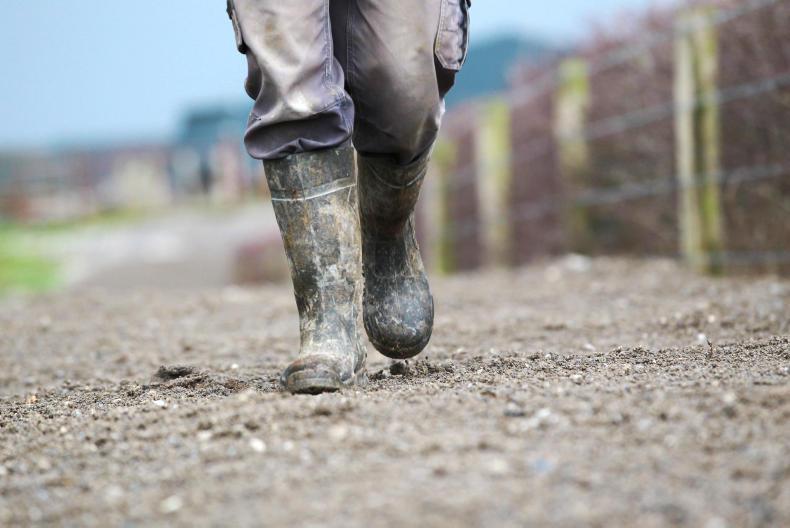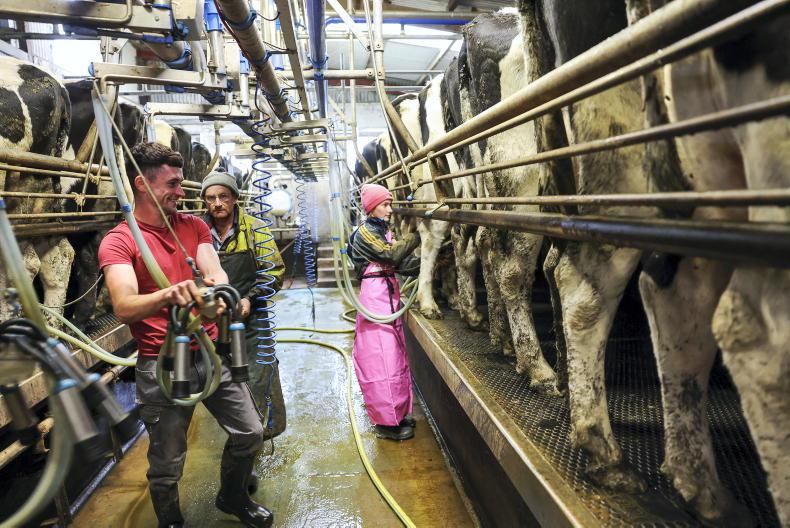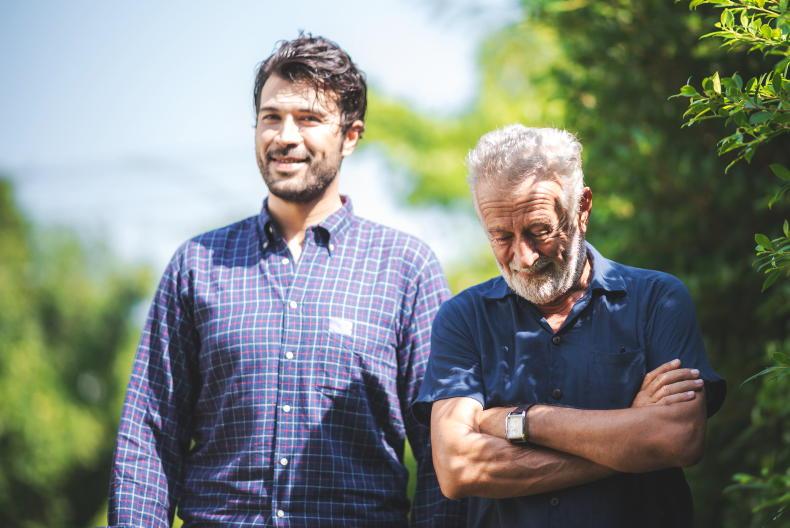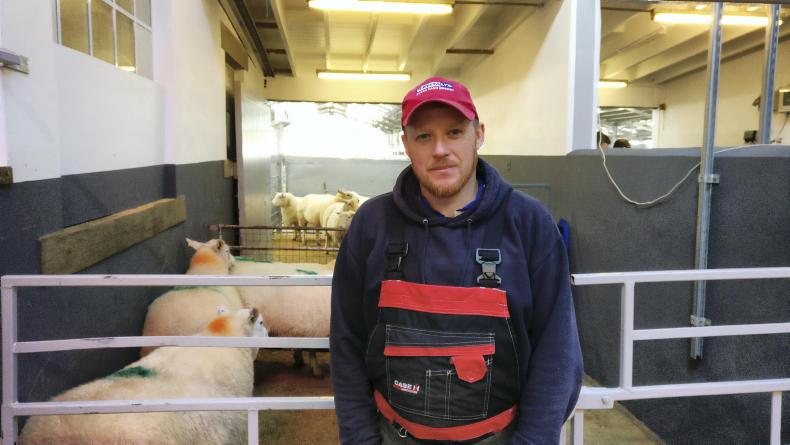“I am currently farming but wish to transfer ownership of the farm to my son in the next couple of years. My son has recently completed his course in agricultural college and has returned home to help out on the farm. I have been advised by my accountant to go into partnership with my son and apply for the scheme where I can claim a tax credit of €5,000 per year over the next five years. Is that the way to go?”
There are various legal, tax and practical considerations to be mindful of in planning to transfer the farm to the next generation. From a practical viewpoint, how you structure the transfer depends on the circumstances of the case, eg age of parent/child, whether all or any of the children want to farm full-time, part-time or farm at all, whether the parent is in receipt of another source of income other than farm income, eg State pension, circumstances of other family members, eg siblings still in full-time education, siblings with special needs, etc.
Based on the outline of your circumstances, it might be worth considering paying your son a wage for the first couple of years based on what you/the farm can afford and your son’s living requirements and thereafter entering into a succession farm partnership. This would facilitate a gradual transfer of knowledge, experience, ownership and control of the farm business and assets, which should be in the best interests of both generations.

Succession farm partnerships
Succession farm partnerships were announced in the Budget in October 2015 and received EU state aid approval earlier this year. The new register similar to the current register for farm partnerships maintained by the Department of Agriculture opened for applications on 1 June 2017.
In return for a farmer signing up to transfer 80% of his/her assets to the successor within years three to 10 of coming on the register, the partnership will qualify for a tax credit of €5,000 per year for five years.
This is split between the partners based on their profit-sharing ratio; unless the successor has reached 40 years of age, in which case the tax credit is payable only for so long as the successor is less than 40 years.
In order to be registered and avail of the tax credits, the partnership must comply with all of the following conditions:
The farm partnership must have at least two members, each of whom shall be a natural person (ie not a company).Of the members of the farm partnership:At least one partner must have been farming on at least 3ha of land for at least two years immediately before the formation of the partnership (the ‘farmer’) and:Of the others, each partner must have an agri qualification (ie the Green Cert or its equivalent) and be entitled to at least 20% of the profits of the partnership and shall not have reached 40 years of age before registration (the ‘successor’).The Teagasc My Farm My Plan Booklet must be completed by the partnership. Teagasc is the certification body for this farm plan.The farmer must enter an agreement with the successor to transfer at least 80% of the farm assets to the successor within 10 years of the commencement of the partnership, which transfer can begin after year three.The terms of the partnership agreement shall include:The farm assets of the partnership on the day the application is made for registration.Any conditions to which the transfer or sale will be subject.The year in which the proposed transfer may take place, andAny other terms agreed between the farmer and successor, such as the conduct of the farming trade or creation of any rights of residence in dwellings on the land.If at least 80% of the farm assets are not transferred within the 10-year deadline, there will be a clawback of the tax credits claimed.
Terms of the succession agreement
Teagasc has produced a specimen template succession agreement (available on the Teagasc website) which can be adapted by a farmer’s own solicitor to provide for the needs and circumstances of the family involved. It has explanatory notes, thus will assist farmers to make enquires and discuss proposals and alternatives with their solicitor, accountant, agricultural adviser and others. The following are of note in the specimen agreement:
The transfer of assets can be stated to be subject to “conditions precedent”, ie conditions that must be satisfied before the agreement can take effect. For example, it may be necessary to obtain release of bank charges over the land being transferred. If these conditions have not been satisfied by the time the assets are due to be transferred, the transfer will not go ahead, which will result in a clawback of the tax credit claimed. The specimen agreement provides that in the event of the death of the farmer (eg parent) prior to the transfer date, the agreement will be legally binding on his/her personal representative and successors in title. However, in the event of the death, bankruptcy or mental incapacity of the successor (eg child) prior to the transfer date, the agreement shall no longer be enforceable against the farmer (eg parent). The specimen agreement provides that the partnership can continue even after the farm has been transferred. The partnership agreement will have to be updated to account for any changes, such as who owns the assets, profit-sharing ratio, etc. The specimen agreement provides that the successor (eg child) is obliged to use his/her best endeavours after the transfer to get the farmer (eg parent) released from liability for bank debt and other long-term liabilities. However, it is acknowledged that the prospects of achieving such agreement may be limited in that it could be at the discretion of the bank/financial institution involved.The specimen agreement provides for the entry of a note of the agreement on the farmer’s folio in the Land Registry until the land is transferred to the Successor (eg child). The purpose of this is to put others on notice that there is a legally binding agreement in place in respect of the lands. The specimen agreement provides that the farm assets (land, buildings, entitlements) other than stock that are subject to the agreement may not be sold or otherwise disposed of unless by mutual prior agreement of the parties. The farmer thus is not entitled to contract to sell, lease, mortgage, charge or deal in any way whatsoever with the lands adverse to the terms of the agreement.The specimen agreement provides that the assets being transferred must be at least 80% of the farmer’s farm assets in the partnership as of the date of transfer. The agreement provides that reference should be made to a percentage of the farm land, buildings and entitlements, which percentage must not be less than 80% measured by area. Livestock and machinery are measured by value, of which not less than 80% in values worth must be transferred.Conclusion
It would be worth devising a succession plan now in conjunction with your professional advisers, eg accountant/tax adviser, solicitor, Teagasc adviser/agricultural consultant so that both generations know what they are working towards over the next number of years.
Read more
Farm tax - putting the power in your hands
Read more from Aisling Meehan
“I am currently farming but wish to transfer ownership of the farm to my son in the next couple of years. My son has recently completed his course in agricultural college and has returned home to help out on the farm. I have been advised by my accountant to go into partnership with my son and apply for the scheme where I can claim a tax credit of €5,000 per year over the next five years. Is that the way to go?”
There are various legal, tax and practical considerations to be mindful of in planning to transfer the farm to the next generation. From a practical viewpoint, how you structure the transfer depends on the circumstances of the case, eg age of parent/child, whether all or any of the children want to farm full-time, part-time or farm at all, whether the parent is in receipt of another source of income other than farm income, eg State pension, circumstances of other family members, eg siblings still in full-time education, siblings with special needs, etc.
Based on the outline of your circumstances, it might be worth considering paying your son a wage for the first couple of years based on what you/the farm can afford and your son’s living requirements and thereafter entering into a succession farm partnership. This would facilitate a gradual transfer of knowledge, experience, ownership and control of the farm business and assets, which should be in the best interests of both generations.

Succession farm partnerships
Succession farm partnerships were announced in the Budget in October 2015 and received EU state aid approval earlier this year. The new register similar to the current register for farm partnerships maintained by the Department of Agriculture opened for applications on 1 June 2017.
In return for a farmer signing up to transfer 80% of his/her assets to the successor within years three to 10 of coming on the register, the partnership will qualify for a tax credit of €5,000 per year for five years.
This is split between the partners based on their profit-sharing ratio; unless the successor has reached 40 years of age, in which case the tax credit is payable only for so long as the successor is less than 40 years.
In order to be registered and avail of the tax credits, the partnership must comply with all of the following conditions:
The farm partnership must have at least two members, each of whom shall be a natural person (ie not a company).Of the members of the farm partnership:At least one partner must have been farming on at least 3ha of land for at least two years immediately before the formation of the partnership (the ‘farmer’) and:Of the others, each partner must have an agri qualification (ie the Green Cert or its equivalent) and be entitled to at least 20% of the profits of the partnership and shall not have reached 40 years of age before registration (the ‘successor’).The Teagasc My Farm My Plan Booklet must be completed by the partnership. Teagasc is the certification body for this farm plan.The farmer must enter an agreement with the successor to transfer at least 80% of the farm assets to the successor within 10 years of the commencement of the partnership, which transfer can begin after year three.The terms of the partnership agreement shall include:The farm assets of the partnership on the day the application is made for registration.Any conditions to which the transfer or sale will be subject.The year in which the proposed transfer may take place, andAny other terms agreed between the farmer and successor, such as the conduct of the farming trade or creation of any rights of residence in dwellings on the land.If at least 80% of the farm assets are not transferred within the 10-year deadline, there will be a clawback of the tax credits claimed.
Terms of the succession agreement
Teagasc has produced a specimen template succession agreement (available on the Teagasc website) which can be adapted by a farmer’s own solicitor to provide for the needs and circumstances of the family involved. It has explanatory notes, thus will assist farmers to make enquires and discuss proposals and alternatives with their solicitor, accountant, agricultural adviser and others. The following are of note in the specimen agreement:
The transfer of assets can be stated to be subject to “conditions precedent”, ie conditions that must be satisfied before the agreement can take effect. For example, it may be necessary to obtain release of bank charges over the land being transferred. If these conditions have not been satisfied by the time the assets are due to be transferred, the transfer will not go ahead, which will result in a clawback of the tax credit claimed. The specimen agreement provides that in the event of the death of the farmer (eg parent) prior to the transfer date, the agreement will be legally binding on his/her personal representative and successors in title. However, in the event of the death, bankruptcy or mental incapacity of the successor (eg child) prior to the transfer date, the agreement shall no longer be enforceable against the farmer (eg parent). The specimen agreement provides that the partnership can continue even after the farm has been transferred. The partnership agreement will have to be updated to account for any changes, such as who owns the assets, profit-sharing ratio, etc. The specimen agreement provides that the successor (eg child) is obliged to use his/her best endeavours after the transfer to get the farmer (eg parent) released from liability for bank debt and other long-term liabilities. However, it is acknowledged that the prospects of achieving such agreement may be limited in that it could be at the discretion of the bank/financial institution involved.The specimen agreement provides for the entry of a note of the agreement on the farmer’s folio in the Land Registry until the land is transferred to the Successor (eg child). The purpose of this is to put others on notice that there is a legally binding agreement in place in respect of the lands. The specimen agreement provides that the farm assets (land, buildings, entitlements) other than stock that are subject to the agreement may not be sold or otherwise disposed of unless by mutual prior agreement of the parties. The farmer thus is not entitled to contract to sell, lease, mortgage, charge or deal in any way whatsoever with the lands adverse to the terms of the agreement.The specimen agreement provides that the assets being transferred must be at least 80% of the farmer’s farm assets in the partnership as of the date of transfer. The agreement provides that reference should be made to a percentage of the farm land, buildings and entitlements, which percentage must not be less than 80% measured by area. Livestock and machinery are measured by value, of which not less than 80% in values worth must be transferred.Conclusion
It would be worth devising a succession plan now in conjunction with your professional advisers, eg accountant/tax adviser, solicitor, Teagasc adviser/agricultural consultant so that both generations know what they are working towards over the next number of years.
Read more
Farm tax - putting the power in your hands
Read more from Aisling Meehan











SHARING OPTIONS